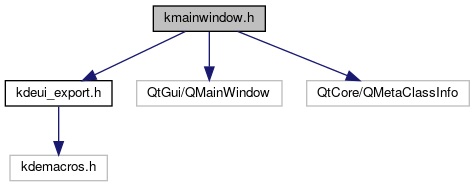KDEUI


Go to the source code of this file.
Classes | |
| class | KMainWindow |
Macros | |
| #define | KDE_DEFAULT_WINDOWFLAGS 0 |
| #define | KDE_RESTORE_MAIN_WINDOWS_NUM_TEMPLATE_ARGS 3 |
| #define | KDEUI_DECLARE_PRIVATE(classname) |
| #define | RESTORE(type) |
Functions | |
| template<typename T > | |
| void | kRestoreMainWindows () |
| template<typename T0 , typename T1 > | |
| void | kRestoreMainWindows () |
| template<typename T0 , typename T1 , typename T2 > | |
| void | kRestoreMainWindows () |
Macro Definition Documentation
| #define KDE_DEFAULT_WINDOWFLAGS 0 |
Definition at line 54 of file kmainwindow.h.
| #define KDEUI_DECLARE_PRIVATE | ( | classname | ) |
Definition at line 48 of file kmainwindow.h.
Function Documentation
|
inline |
Restores the last session.
(To be used in your main function).
These functions work also if you have more than one kind of toplevel widget (each derived from KMainWindow, of course).
Imagine you have three kinds of toplevel widgets: the classes childMW1, childMW2 and childMW3. Than you can just do:
kRestoreMainWindows<>() will create (on the heap) as many instances of your main windows as have existed in the last session and call KMainWindow::restore() with the correct arguments. Note that also QWidget::show() is called implicitly.
Currently, these functions are provided for up to three template arguments. If you need more, tell us. To help you in deciding whether or not you can use kRestoreMainWindows, a define KDE_RESTORE_MAIN_WINDOWS_NUM_TEMPLATE_ARGS is provided.
These global convenience functions (that come with a varying number of template arguments) are a replacement for the RESTORE macro provided in earlier versions of KDE. The old RESTORE macro is still provided for backwards compatibility.
Definition at line 775 of file kmainwindow.h.
|
inline |
Definition at line 784 of file kmainwindow.h.
|
inline |
Definition at line 798 of file kmainwindow.h.
Documentation copyright © 1996-2020 The KDE developers.
Generated on Mon Jun 22 2020 13:24:01 by doxygen 1.8.7 written by Dimitri van Heesch, © 1997-2006
KDE's Doxygen guidelines are available online.
 KDE API Reference
KDE API Reference